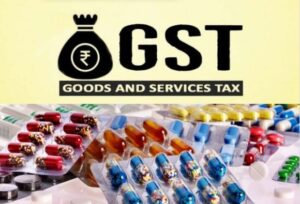-
 Open Hours: Mon- Sat 10:00 am - 06:30pm
Open Hours: Mon- Sat 10:00 am - 06:30pm
Impact of GST Rate Changes on PCD Pharma Franchise Businesses in India
Investment In A PCD Pharma Franchise
September 8, 2025Difference Between Generic And Ethical Medicine In India
September 29, 2025Impact of GST Rate Changes on PCD Pharma Franchise Businesses in India: The GST refers to Goods and Services Tax, which was launched in 2017 as a tax regime. This is the replacement of the old complex web of indirect taxes, which makes compliance easier and promotes more transparency. Then the Indian government launched the GST 2.0 in September 2025, next next-gen version of the tax that sought to lower costs for essential commodities, simplify compliance, and rationalize rates. Here, we are going to discuss the Impact of GST Rate Changes on PCD Pharma Franchise Businesses in India.
PCD Pharma Franchise is the pillar of the Indian pharma distribution model because the top pharma giants give the marketing and distribution rights to the franchise partners in their respective areas. The success of this business model solely depends on the pricing of the medicines being affordable and competitive in nature. Any change in the rates of GST has a direct impact on the medicines’ prices, and this impacts the profit margins along with other aspects.

GST 2.0 completely revamped the slab system and made certain amendments to necessary and discretionary items. Thus, in this article, we must know what Impact of GST Rate Changes on PCD Pharma Franchise Business in India.
Table of Contents
ToggleGST 2.0 Rate Structure—Overview
Before, GST consisted of four principal slabs of 5%, 12%, 18%, and 28%. With GST 2.0, this slab has been altered, as described below:
- 5%—This is for basic products like food, household commodities, and most fundamental healthcare items.
- 18%—It is used for non-essential commodities and services that comprise some over-the-counter drugs and wellness items.
- 40%—This is for sin and luxury items like cigarettes, high-end cars, and soft drinks.
For the drug industry, some good news is that the most lifesaving drugs, vaccines, and essential medicines still remain at 5% to keep them affordable for patients. Alternatively, less important products such as dietary supplements, nutraceuticals, and other wellness products are taxed at 18% which may further push up their prices. For the PCD Pharma Franchise Business, this GST 2.0 has both positives and negatives, as this renders the medicines required at an affordable price, which increases sales, and increased taxes on non-essential items decrease their demand.
GST Impact on Pharma Franchise Business
Now, let us examine how GST is altering the functioning of a pharma franchise business in India. It can be summarized in a nutshell as follows:
1. Single Tax Applies Everywhere
- Earlier, every state used to have a different tax. A product in Delhi was subject to a different tax than that of the same product in Maharashtra. It was complete chaos!
- Under GST, there is just one tax applicable everywhere in the country! This implies that if you sell medicines in Delhi and Jaipur, you need not worry about separate state taxes.
2. Better record-keeping
- With GST, you need to keep proper records of purchases, sales, and tax, and also file monthly or quarterly returns online.
- Yes, it takes a bit of time, but it keeps your business clean, legal, and tidy. Franchisees with good GST records will never have any issues getting commercial renovations, as banks prefer businesses with the proper tax records.
3. Easier to Expand Business
- Under GST, it is very simple to start a new pharma franchise in another city. You don’t have to register individually in all states.
- Once you register for GST, you can sell anything tax-free anywhere in India. This allows you to grow easily and fast!
4. Less Hidden Costs
- Prior to GST, taxes were concealed at nearly every level, from manufacturing to wholesaling to retail. With one tax now, all charges are clear.
- It enables you to plan more effectively, manage prices, and operate your franchise successfully without any surprise expenses.
5. Growing Trust among Doctors and Chemists
When you issue a correct GST invoice, it proves to medical professionals and druggists that your business is reliable. Demonstrating that your franchise is legal and well-managed. Individuals prefer to do business with those who obey taxation.
Challenges of GST in Pharma Franchise
Although there are several positives, there are some challenges to GST that the franchisees might face:
1. Knowledge of Rules
For those new to the business, initially, it is confusing to comprehend GST returns and rules. After getting to know the basics, or a tax person explaining things to you, it becomes simple.
2. Online Filing of Returns
GST returns are to be filed only online. This implies having a computer or smartphone that is connected to the internet and basic knowledge of filing the forms.
3. Changes To Tax Rates
Now and again, the government changes the GST rate on these items. It is your job as a franchise owner to know about these changes so you do not get it wrong.










 Call Us Number +9570599567
Call Us Number +9570599567 Get PCD Pharma Distributorship
Get PCD Pharma Distributorship
